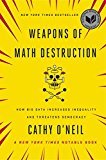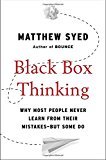5 books on knowledge, the history of knowledge and artificial intelligence
Every month I send out a monthly newsletter called "Build Your Knowledge" that recommends 5 books on a specific theme.
Welcome to BYK #3. This issue is an exploration of human knowledge from a few different perspectives. There's a book about America’s attempt in the late 1800’s/early 1900’s to breed a smarter population via eugenics all the way up to how we’re using data and algorithms as are our starting blocks to build an artificial intelligence.
There’s also a newly published post from our friends at Wait But Why about one of the most ambitious superintelligence projects led by Elon Musk called Neuralink (http://waitbutwhy.com/2017/04/neuralink.html). This is a good starting point for anyone interested in an overview of neuroscience, brain anatomy and Neuralink’s goal to integrate technology with our brains.
As the future of AI continues to overtake our whole lives, I hope these books below give you a good idea of different approaches humans have taken to become smarter.
Thinking Machines: The Quest for Artificial Intelligence--and Where It's Taking Us Next
by Luke Dormehl

Get the book: http://amzn.to/2oQo74x
Have you heard of Knocker Ups? Their job was to go around waking people up in Britain and Ireland back in the day. The entire Knocker Up industry was destroyed with the advent of affordable alarm clocks in the 1950’s. Technology has always forced humanity to think up new work models and many industries have come and gone because of the technology advances. What can potentially be the biggest change to humanity is artificial general intelligence.
Thinking Machines is a primer on the history of humanity’s pursuit of artificial intelligence. The first half of the book goes more into the history and the second half has more information on current projects as well as the future potential of AI. There is a lot of data being created, but the alarming issue is the state of data; unorganized and unlabeled. As we continue moving towards a world of cleaner, more organized data (aka metadata), the information that can be extrapolated from the results is going to affect a lot of decision making for humans, companies, and the tech products that we use.
Weapons of Math Destruction: How Big Data Increases Inequality and Threatens Democracy
by Cathy O’Neil

Get the book: http://amzn.to/2pGgQsU
Many of our current approaches to artificial intelligence revolve around data mining and figuring out the patterns in large datasets. A lot of the data analyzing comes by way of machine learning and algorithms to help sort our existing data and extrapolating results to “predict” future choices. This system of relying on algorithms has led to so many of our technologies “recommending” content to us or choices that, based on our past data, we would most likely agree with…Amazon’s recommended items to buy, Netflix recommended films to watch, Facebook’s recommended content to ingest, etc. Cathy O’Neil’s book goes through examples of how a majority of these algorithms, she calls Weapons of Math Destruction, requires adjustment for to end destructive and dangerous feedback loops that augment biases. Some examples include the criminal ranking system that ranks a person on whether a criminal is likely to relapse back to criminal behavior, political polls that mislead us into the overconfidence of their results, and student test scores that deceive the actual performance and growth of students.
Moonwalking With Einstein: The Art and Science of Remembering Everything
by Joshua Foer

Get the book: http://amzn.to/2mZUodn
Author Joshua Foer became intrigued with how memory worked and it led into the world of memory hacking and hardcore memory nerds who are able to memorize up to 27 packs of cards, 100,000 digits of pi and more astonishing memory feats. Though intelligence in not memory, having a strong ability to remember things seem to go hand-in-hand in a feedback loop. The more you know, the more likely you will remember things because of associations and the strengthening of a “knowledge map.” Mind mappingis a technique to visualize and organize information to help a person build a stronger context into how content is related. Foer takes the reader on a journey, describing the history of humanity’s understanding of memory then into the world of memory tournaments, where people compete to become the world memory champion. You won’t become a better memorizer from reading this book, but you will understand the basic techniques on how to improve your memory and learn more about memory hackers who advance their memory as a hobby.
Black Box Thinking: Why Most People Never Learn from Their Mistakes--But Some Do
by Matthew Syed

Get the book: http://amzn.to/2qsSob6
Black Box Thinking takes case studies from many different industries, companies, and people about failure and how they embrace the failure to improve future success. Syed starts out with learnings from the medical and aviation industry and how they’ve built a culture that approaches near 100% success rates. One of my favorite examples was the explanation of cognitive dissonance and how Neil deGrasse Tyson was misquoting George Bush for years. Syed’s book is a list of best practices to improve any organization or individuals’ approaches to minimize mistakes that include cognitive dissonance, randomized control trials, and the integrating the habit of post-mortems. This book is helpful to accept that mistakes are a part of the experience and maximizing how we learn from them will build future success.
Imbeciles: The Supreme Court, American Eugenics, and the Sterilization of Carrie Buck
by Adam Cohen

Get the book: http://amzn.to/2oQ0Uj8
Eugenics - the science of improving a human population by controlled breeding to increase the occurrence of desirable heritable characteristics. Did you know that the American eugenics movement beginning in the 1880’s hoped to control the growth of “undesirable” populations, particularly those who were “diagnosed” as feeble-minded or mentally ill? Based off of a misinterpretation of Mendelian genetics research and Darwin’s theory of evolution, eugenicists argued that forced sterilization of those of a lower “knowledge level” and minorities would prevent the dumbing down of the American population. This was a time where even prominent people such as Theodore Roosevelt, Helen Keller and Alexander Graham Bell supported eugenics. The American eugenics movement was so mainstream that Nazi Germany had praised it as a blueprint for the German Republic. Aaron Cohen’s book interweaves the history of the American eugenics movement with the story of Carrie Buck, the first case of forced sterilization.
I started this project mainly because I was inspired by so many books and wanted to motivate friends to always be learning too. Each month, I'll send reviews on 5 books on a specific theme or topic. If you have comments, books to recommend or any feedback, hit me up! If you want to subscribe just sign up here or email me: [email protected]
Congratulations @phiunit! You have completed some achievement on Steemit and have been rewarded with new badge(s) :
Click on any badge to view your own Board of Honnor on SteemitBoard.
For more information about SteemitBoard, click here
If you no longer want to receive notifications, reply to this comment with the word
STOPBy upvoting this notification, you can help all Steemit users. Learn how here!
Congratulations @phiunit! You have received a personal award!
Click on the badge to view your own Board of Honor on SteemitBoard.
For more information about this award, click here